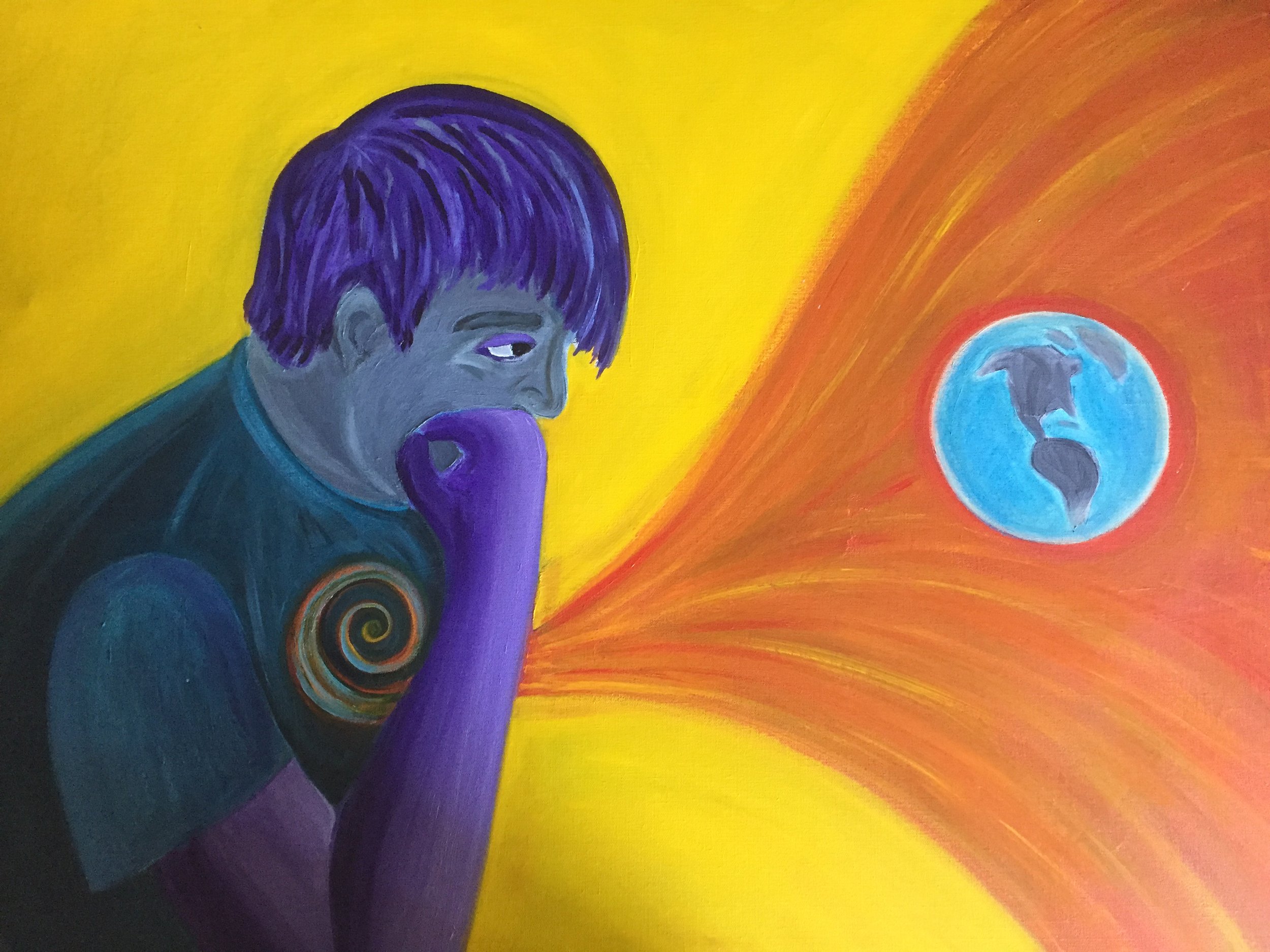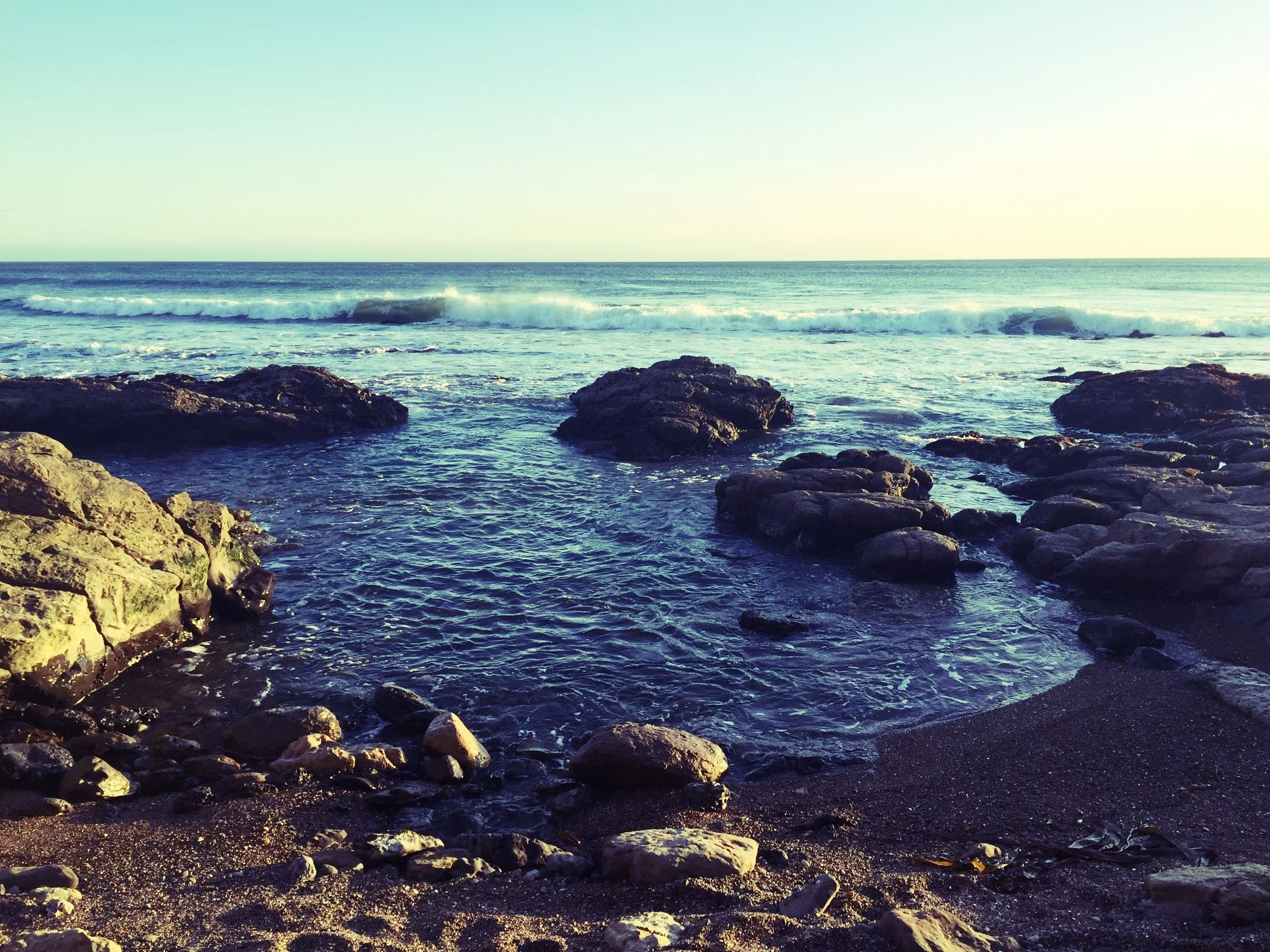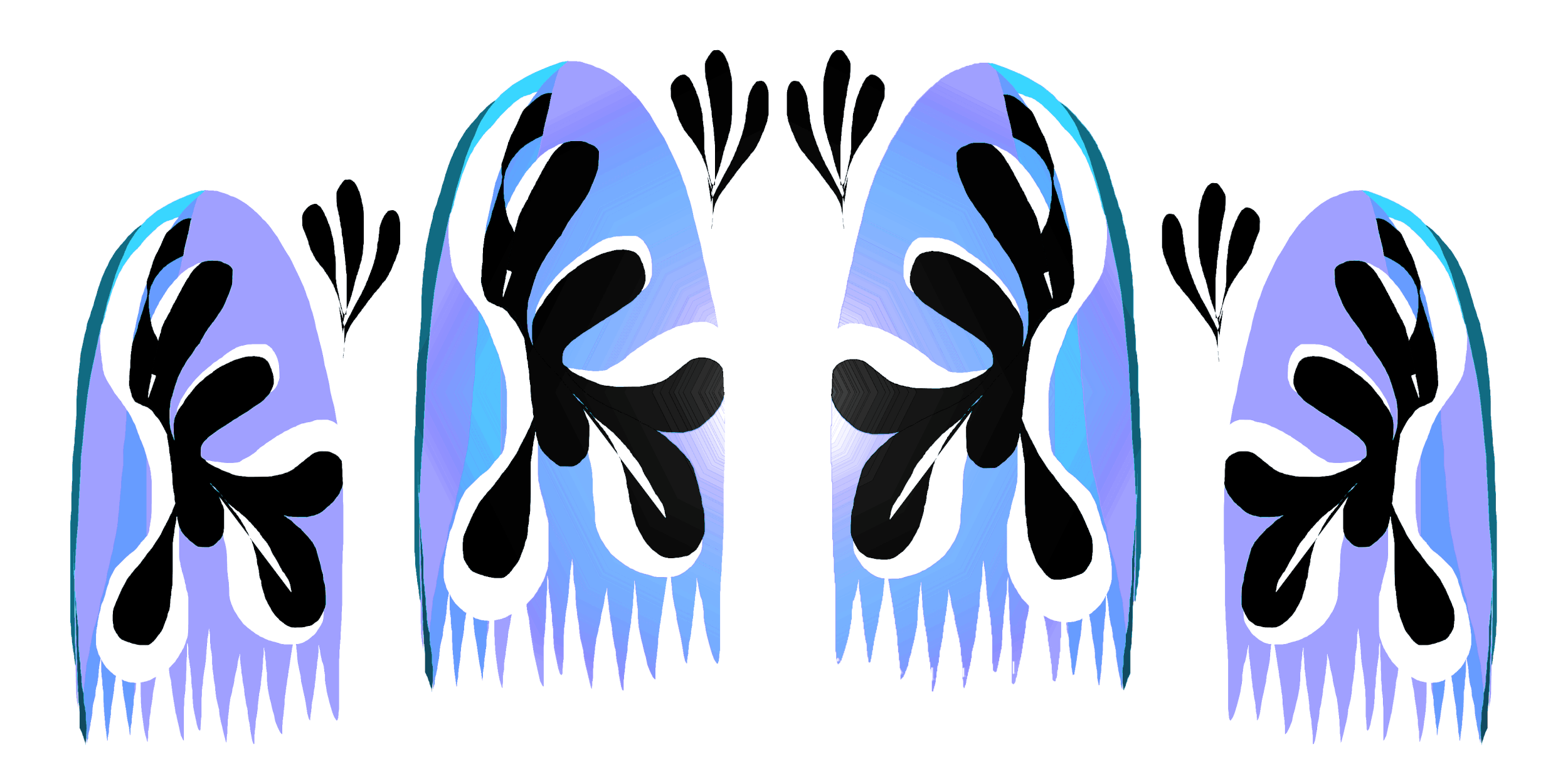In Praise of -Less: [transMad shouts from absent (pl)aces]
With thanks and admiration to Ulysses C. Bougie and Twoey Gray.
0.
[this gender is lack. It is first and foremost an exercise, a position, and an illogic. its purpose rests in defamiliar. the void is the point.]
I.
See: I am agender, but I am not agender; I am genderless.
I am a thing one might say
to a
void.
II.
The a-spec milieu, to me, has always felt something like a magical hallway with walls that reach the clouds. With every pass, wanderers meet more compartments, doors, windows, and levers –– with each effort to pry them open emerges another delight, another alien and generative mechanism.
More than a decade ago, when I was a yet-undiagnosed autistic preteen, I was hungry for language. I was hungry not only to describe my own experience but also to hoard, to index, to archive, to resist the denial of adequate language for my experience that I would later know as hermeneutical injustice [1]. Given these conditions, perhaps it is no surprise that ace identity –– extensively articulated and deeply theorized on Tumblr –– was my entrance point to broader queer/trans identification.
I discovered asexuality, and with it, ace community, when I saw “actuallyasexual” cotagged on “actuallyautistic” Tumblr posts, which I read religiously. I had just turned twelve when I made my awkward, trembling coming-out post in the tag. This was 2012, prior to the heyday of “ace discourse” and attendant harassment on the site –– aceness, in my experience, was treated as confusing but benign in the rare times it entered broader queer conversations at all. No matter how little-known, I felt a sense of relief at having a name for this absence I felt, struggled with, feared, even though it was a fundamental part of me.
I did not anticipate receiving much response to my post –– at the time, the ace hashtags weren’t especially popular, and I had fewer than 100 followers. Imagine my delight, then, in receiving a “welcome” message from someone I considered at the time to be an “ace elder.” (Reader, she was sixteen). I discovered long-form blogs off-Tumblr (many via Carnival of Aces), run mostly by other autistic asexuals. I first felt held here, this site
of similar
-difference.
III.
I identified somewhere along the asexual spectrum for most of my teenage life — grey-A, mostly, in case I accidentally “transgressed”; at the time, my understanding of the label “asexual” was far less fluid and nuanced than the articulations I see today, and I feared a single instance of sexual desire would permanently delegitimize me. It was not that I wasn’t consuming sexual content –– I certainly was, perhaps unadvisedly –– it was that sex and marriage were, to me, beyond the realm of the imaginable. So horrifying as to cause cold-sweats, especially as my peers began to date and the scale of social pressure made itself felt. Asexuality was, to me, the best language through which to articulate this terror and alienation. It was a means of denoting a / voidance that, in its non-existence, built seemingly insurmountable borders between myself and my peers –– presumably allocishet, sane, neurotypical girls, whose social and ideological orientations confused me perhaps even more than their sexual counterparts. And it was a way of saying “no,” of asserting my right to disengagement.
At the time, then, I regarded (and described) asexual as a kind of placeholder — like atheism — to denote a space without but which remained possible. By this I mean not only the inside of an empty space, but also all that is external to it, now thrown into stark relief. Ace was a signal, a cry of shared alienation: it said, “sexual attraction is weird, actually!” and left in place of normative desire a generative sense of ambiguity. In short, ace was a / void: a void in the place of allocisheteronormative relationality and a(n) a / voidance of the normatively social, the predictably relational. While at the time, I did not know that the future I am currently living was possible, I certainly knew that the future desired of me –– marriage, womanhood, biological children –– was not survivable.
IV.
Hence my genderless naming.
Hence my hollowing of this sp(ace).
Hollow bread points to the full-bellied mouse.
V.
I approach queerness, transness, disability, and Madness with all eyes pointed toward discomfort. My early attempts at telling others that I was asexual were, indeed, uncomfortable: I was met with confusion, wrongheaded reassurance that, as in the case of my horror at the prospect of becoming pregnant, I would grow out of it (while I am indeed no longer ace, my 2019 hysterectomy certainly casts doubt on this ageist platitude), or outright hostility. A friend asked me whether my aceness –– in her mind, my heartbreaking lack of prosocial desire –– could be attributed to my parents’ marital problems. Another earnestly asked me if asexuality was “some kind of mental illness.” At the time, I reassured them and other naysayers that, in fact, my asexuality was fully normal and healthy. Given that I am neither a normal nor a healthy person, this was, of course, a lie.
I have never been healthy. I am disabled, neurodivergent, and Mad. Just as the designations I use for myself today (genderless, lesbian, dyke, queer, trans) delicately interlink with my experiences of non-normative embodymindment and dissent from consensus reality, my aceness, too, was tied to my experiences of disability. At first, this was most evident in the connection between my autistic experiences of social alienation and my asexual identity. Later, dramatic changes in my material embodiment “interrupted” what could have been burgeoning sexual development, though I have no interest in the “milestones” thrown by abled, straight temporality. Neither then nor now do I consider myself to have been merely a “late bloomer,” or some other term that would mark my asexuality as a blip in my now-lesbian development, simple manifestation of compulsory heterosexuality or expression of body-hatred. Rather, I increasingly identify my past asexuality –– and the present and discomfiting absence of the genderless that I inhabit today –– as parts of a conceptual framework through which I make my world
livable.
VI.
Of course, my refusals of puberty and womanhood were also tied to my experiences of asexuality, disability, and Madness: my adolescence was (and my adulthood remains) a time of profound hostility toward the body, and toward the unconsenting intimacy with which “I” am pulled to it. Yet amidst that self-hatred, I refuse to mark my asexual identification as illegitimate. I refuse, also, to reduce my genderlessness to body alienation alone, even as I readily embrace their complex entanglement.
In short, I do not believe that disability, Madness, neurodivergence, and trauma invalidates those identities borne of it. Rather, I think of trauma, Madness, and chaos to be crucial ways of knowing –– and this includes romantic/gender/sexual self-knowing. Such transMad epistemologies, as I term them elsewhere, are especially crucial inasmuch as they challenge not only the boundaries of identity, but also of the possible. Under this framework, my body-hating aceness, and today, my body-hating genderlessness, are not foreclosed due to some value judgement levied against my “sanity.”
Instead, my Mad carves them open.
VII.
My previous ace and current genderless identifications have not been nodes on a gender-sexual journey running parallel to one of disability and Madness. Rather, they have mingled in the production of all of my selves. I have long hopscotched from absence to absence, void to void. I have wished to empty myself, to pass nothing and never return. I have longed for the language to describe my present-lack, only to realize that the only legible language is the language of pathology.
Today, I am not on the aromantic or asexual spectrum, though I identify strongly with aro/ace critiques of amatonormativity. I am as suspicious of those who organize their lives around romantic pairing as I am of those who organize their lives in accordance with the strictures of binary gender –– in short, I am suspicious of “commonsense.” I share a-spec and xenogender communities’ impulse toward self-sculpture, retrieving new and renewed identities from the bitter clay of hierarchical taxonomy [2]. I am heartened and awed by my comrades and colleagues, who reinvent language in order to build community, understand their experiences, and even poke fun at normative gender/sexual discourse. I celebrate in particular the philosophy of voidpunk [3], this burgeoning community of crystalized absence and generative fullness. Here is a space to collect the defectors –– from gender, sex, romance, sanity, species, and more. Here are a surfeit of words to defy with.
Queer wordfuckery is fundamentally tied to my Madness, and particularly what I have elsewhere called my transMadness [4] –– an unruly and profoundly relational approach to knowledge-production that refuses to be constrained to/by legible language or “realistic” thought. Here, “trans” is the verb my Madness takes as I refuse to engage in the project of cisheteronormative social life. This, to me, is also the political philosophy undergirding queerness writ large, and one I first identified in myself when joining ace communities more than a decade ago. In that sense, my mode of identification was durable and deeply accurate: regardless of my current relationship to sexual attraction, my alienation from (and, admittedly, disdain for) for normative frameworks of love and sex is stronger than ever.
(How might I language this
distaste?)
VIII.
Today, I am genderless. While throughout my life I have migrated identities, and anticipate more migrations in the future, I have remained consistent in my attachment to (a)voided things. Whatever the truth has been, I have been a dissenter, oftentimes a pathological one, and I equally refuse to equate dissent with stagnation or foreclosure. Rather, the -less in my genderless holds similarities with terminologies of lovelessness [5] in recent aromantic community scholarship, referring variously to those who refuse the commonsense framing of “love” as inherent good, inborn characteristic, and social necessity.
Likewise, when I claim “genderlessness,” I indicate a politic not of variance within an existing gender spectrum but a defect/ion from it. My goal, then, is not merely to publicly identify myself as different-from-cis, but to generate a political and intellectual project aiming to undo the hierarchical, taxonomizing, and, indeed, medical violence of gender itself: to carve alternative modes of being in the world. Alongside other radical a-spec terminologies, loveless and genderless are designed for worlds beyond allocishet perception.
To be -less, to me, is to be stark: it is to euphemize an absence that, for me, the comparatively-friendly “nonbinary” or even “agender” signify, though both also carry immense meaning and utility in trans lives and communities The ideology of “-less” need not even be expressed by the suffix itself; it is expressed, rather, in a social architecture of refusal in which other intimacies and relationalities might form. Here, absence is not a problem to be fixed nor a misperception of presence. Absence, shared absence, is willful and deliberate. Absence makes vital (sp)ace for new things to grow. Absence is stark, leaving abrasions on the unsuspecting onlooker; this is what I indicate in my choice of -less. The ideology of -less does not merely expand the limits of acceptable discourse on love, sex, and gender, it jars the ideological containers in which we store them. It reaches the end of the hall of possibility and it opens a window.
Madly, I want
a sexless, genderless, loveless world. By this, I mean I demand that the conceptual straight-jacketing of these terms be abandoned. By which I mean I resist the forces which demand I express my intimacies in the terms set out for me. Instead, I choose to claim the social deviance I symptomatize, remaining ever-firm in my againsthood.
POSTSCRIPT:
(Consider the following: peerless, dauntless, faultless, limitless.
[Would I ruin the gravity of my statement here if I concluded that sometimes, -less is more?])
###
Notes:
[1] See Miranda Fricker. Epistemic injustice: Power and the ethics of knowing. Oxford University Press, 2007.
[2] I speak at greater length about xenogender identificatory possibility in my (2021) submission to the Queer Disability Studies Network, “Xenogenders, Neopronouns, and the transMad toolbox.” https://queerdisabilitystudies.wordpress.com/xenogenders-neopronouns-and-the-transmad-toolbox/.
[3] According to the subreddit r/voidpunk, Voidpunk is defined as a “subculture for those who often feel rejected or disconnected from humanity. This is popular within aro-spec and ace-spec communities but also includes groups such as neurodivergent people, disabled people, non-binary people and other groups that are frequently dehumanized or called 'subhuman' by society. Voidpunk is based on embracing the idea of being 'not human'. While many of these marginalized groups seek to prove their humanity to their oppressors, voidpunk aims to, instead of claiming humanity, instead, recognizes that these oppressors are bigoted and taunts them by saying "Maybe I am not human by society's standards. What about it?" Voidpunk rejects to define humanity, as every attempt at a definition will inevitably be wrong.
[4] I coined “transMadness” on July 22, 2021, with the blog post “Toward transMad epistemologies: a working text.” Cavar, Sarah. 2021. https://www.cavar.club/transmad. I thank J. Logan Smilges for providing me the generative space to imagine this term.
[5] For a brief history of the development of lovelessness, see Alice-Luke (@aroarolibrary)’s (2022) Tumblr post, “On the evolution of aromantic, loveless, and aplatonic communities” https://aroarolibrary.tumblr.com/post/681788758426812416/.
![In Praise of -Less: [transMad shouts from absent (pl)aces]](https://images.squarespace-cdn.com/content/v1/5610dfd1e4b0c37386dd0a90/1659648499809-1LC9XWPOEZRJ99E5EME0/FACES.png)



